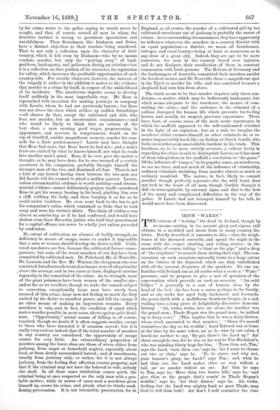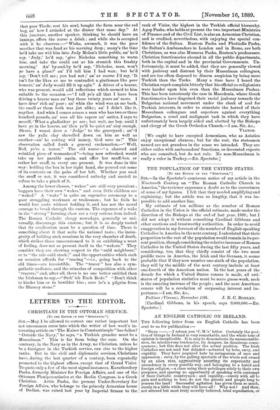IRISH "WAKES."
rpHE custom of " waking " the dead in Ireland, though by
no means existing in its ancient glory and vigour, still obtains in a modified and shorn form in many country dis- tricts. Briefly described, it amounts to this,—that the neigh- bours of the deceased assemble, and spend the night in the room with the corpse, chatting and telling stories : in the meanwhile, of course, taking "a blast av the pipe" and a drop of "the craythure" to sustain them during their vigil. The con- versation on such occasions naturally turns to a large extent on the virtues of the departed, which are duly embellished with all the natural eloquence of the speakers. No one un- familiar with Ireland can at all realise what a scene a " Wake " presents ; and we propose to give a sort of specimen of the conversation which prevails on such an occasion. "An ould follyer " is generally in a seat of honour, close by the head of the bed : she has been a nurse perhaps in the family, and as she rocks her aged body backwards and forwards, she pours forth with a mellifluous Southern brogue, in a sad, wailing tone, a long piece of delightfully discursive domestic history. " Ah, wisha, wisha, lave me alone, the masther was the grand man ; Thade Regan was the grand man ; he milked up to forty cows." [This implies that he was a dairy-farmer, whose stock amounted to that number.] "Shure it's meself remimbers the day av his weddin' ; Lard Edward was at home at the time by the same token, an' as he wint by our cabin, heerd me mother to say, By gar, there's the Lard up !' An' • shure enough he was, for he was on his way to Tim Hoolahan's, who was minding thirty hogs for him. 'Turn thim out, Tim,' says the Lard, turn thim out,' says he, 'for I want to choose out two av thim,' says he. To be shure, and why not, your honour's glory, me Lard P says Tim ; and, whin he had thim out, the Lard makes chice av wan widont a tail, an' av anoder widout an ear. An' thin he says to Tim, says he, Have thim two bastes kilt,' says he, and give thim to the people that's comin' to Thade Regan's weddin',' says he, for their dinner,' says he. Ah, wisha, deeling, but the Lard was mighty fond av poor Thade, may God be wid thim both ! An' don't I well remimber the time that poor Thade, rest his sow!, bought the farm near the red bog, an' how I attinded at the dinner that same day." At this juncture, another speaker, thinking he should have an innings, offers the nurse a drink ; and while she is occupied with it he observes :—" Wisha, awenoch, it was the poor masther that was fand av his marning drop ; many's the time he'd take me wid him into Judy Molan's little public, an' he'd say, Judy,' he'd say, give Nicholas something to warm him, and take the could out av his stumick this frashty =ruing.' An' by-and-by he'd say, Nicholas, man, won't ye have a glass?' an' I'd tell him I had wan ; but he'd say, Don't tell me ; you had not ;' an' av worse I'd say, `It isn't for the likes av me to contradict a gintleman like your honour,' an' Judy would fill it up a.gin." A driver of a hearse, who was present, would add reflections which seemed to him
suitable to the occasion I tell ye's all that I have been driving a hearse man an' boy these twinty years an' more. I have druv' rich an' poor ; an' whin the wind was an me back, the smell av them both was jist alike ; an' I didn't like it, nayther. And whin I comes acrass a man who has two or three hundred pounds, an' sees all his capers an' antics, I says to meself, What a gladiathur ye are ; but wait, me boy, until I have ye in the hearse, an' then yell be quiet an' aisy enough. Shure, I wanst druv a ''ledge' to the graveyard ; an'•I saw the yalla clay shovelled down on him as well as another—an' he rotting wid money, God save us !" This observation called forth a general exclamation,—" Well, Ned, ye're a terror." The old nurse—" a charred and wrinkled piece of womanhood "—being now refreshed, would take up her parable again, and offer her snuff-box, or rather her snuff, to every one present. It was done in this way : holding the box in her right hand, she poured out some of its contents on the palm of her left. Whether you used the snuff or not, it was considered unlucky and uncivil to refuse to take a pinch of it.
Among the lower classes, "wakes" are still very prevalent ; beggars have their own "wakes," and even little children are "waked." A "wake" is quite an expensive ceremony to a poor struggling workman or tradesman ; but he feels he would lose caste without holding it, and has not the moral courage to break through the custom. The expenses of a wake in the " strong " farming class are a very serious item indeed. The Roman Catholic clergy nowadays, generally or uni- versally, discourage this custom ; but it is so deeply rooted that its eradication must be a question of time. There is something about it that suits the national taste ; the incon- gruity of holding such reunions in the very chamber of death, which strikes those unaccustomed to it as exhibiting a want of feeling, does not so present itself to the " wakers." They consider they are showing respect to the " ould neighbour," or to "the rale ould stock ;" and the opportunities which such an occasion affords for "tracing "—i.e., going back to the old times—are irresistible. The " tracer " has also a sym- pathetic audience, and the stimulus of competition with other "tracers ;" and, after all, there is no one better entitled than the Irishman to say,—" Steh' ich Erich Rede." "Don't think to hinder him or to bewilder him ; sure he's a pilgrim from the Blarney stone."



















































 Previous page
Previous page